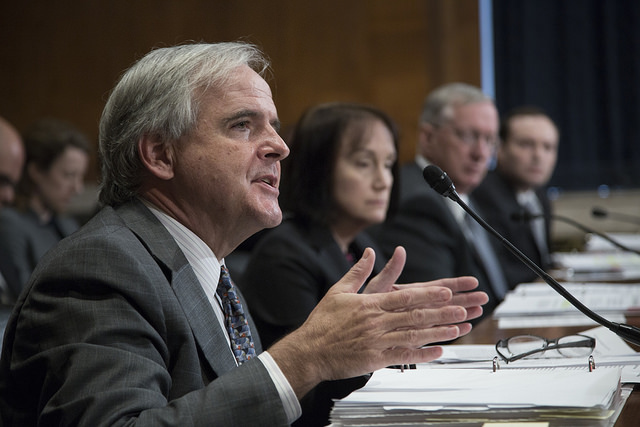In two separate decisions earlier this month, the Nuclear Regulatory Commission (NRC) voted to change its procedures in ways that will weaken protection of nuclear power plants against terrorist attacks and will defer for many years important upgrades to the security of nuclear waste in dry storage casks. And more changes in this direction are likely to come.
If the threat of terrorism against critical infrastructure in the United States has indeed diminished to the extent that these actions are appropriate, UCS never got the memo.
In fact, according to a report recently released by the House Homeland Security Committee, the Islamic State has to date inspired or directed 17 attack plots on targets within the United States. Justice Department officials said this month that domestic terror groups pose an even greater threat to the U.S. than foreign groups like the IS. And the NRC staff, as recently as March of this year, said publicly that the general credible threat to the nuclear sector has not decreased since the September 11, 2001 attacks.
Yet by their actions, the NRC commissioners appear to be partying as if it’s still September 10. In doing so, they are failing to uphold their obligation to protect public health and safety and assure the common defense and security. Instead, they are handing the nuclear industry just about everything that it wants.
Even more notification for force-on-force tests
One decision concerns the protocols for NRC-run “force-on-force” inspections of nuclear power plant security. I’ve written often about the importance of these inspections, currently conducted every three years. They involve the use of a team of mock terrorists to test the ability of nuclear plant security forces to protect their facilities from radiological sabotage attacks that could cause a reactor meltdown or damage to spent fuel in storage pools. (Spent fuel stored in dry casks is not designated as a target for force-on-force tests: a big loophole.)
The tests are crucial because the NRC learned a long time ago that having a good security plan on paper was not a guarantee that a plant security force could effectively carry out the plan in practice.
The tests are intended to be as realistic as possible, but they have significant limitations. For one thing, they lack the element of surprise, which is one of the most critical tactical advantages of a real attacking force. A nuclear site must be notified well in advance of the inspection to ensure that security forces know that it is not a real attack and to give the plant management time to implement measures to maintain safety and security during the tests. However, the more advance notice the NRC provides, the more time and resources become available for plant management and security forces to prepare for the test, and the less representative the test will be of an actual surprise attack.
In the force-on-force test program that was carried out in the 1990s, nuclear plants were given 6-12 months’ advance notice, and plant managers spent hundreds of thousands of dollars getting ready. (Even so, about 50% of the plants failed the test.) But after the 9/11 attacks, when the program was revamped and strengthened, the NRC staff mandated that the notification period should not be greater than 12 weeks because “a longer notification window might not provide as accurate an assessment of typical security force readiness.”
But in a paper dated (perhaps inauspiciously) September 11, 2015, the staff proposed that the notification window be increased again to 9-15 months so that the inspections could be included in the regular periodic notice of all upcoming inspections that are sent to licensees, which according to the staff would “minimize disruptions to the NRC and licensees without impacting the integrity of the inspection program.” And on October 6, the four sitting NRC commissioners voted unanimously to approve the change.
Now, if only the NRC could schedule a real attack 15 months in advance, we’d be all set.
Delaying safety requirements for dry casks
In the second decision, the commissioners voted to approve another staff proposal submitted on September 11 of this year and postpone the schedule for developing new requirements for protecting spent fuel in dry cask storage from sabotage by five years. (Commissioner Jeff Baran wanted a 1-year delay but was outvoted.) This move will delay the effective date of the rule from the end of 2018 to the end of 2023.
There are a number of good reasons for implementing this rule sooner rather than later, but perhaps the most important one is that the current rules do not provide adequate protection of dry casks from certain types of terrorist attack scenarios, as the NRC has acknowledged publicly.
While UCS strongly supports the expedited transfer of spent fuel from dangerously overstuffed pools to dry casks, which will reduce risk, we also want to ensure that fuel in the dry casks will not pose a significant danger to the public. Although we have concerns with the proposed security rules, they provide the best hope for upgrading dry cask protection to address any outstanding vulnerabilities.
Also, given the significant number of reactors that will be decommissioned over the next decade and will need to build or expand dry cask facilities to store their spent fuel, it makes no sense for the NRC to wait to develop the new requirements, which could affect the types of casks that utilities will purchase and the way they will be stored. (This assumes, of course, that the new security rules ever get implemented at all. Given the experience of a recent rulemaking on containment vent filters that the NRC first delayed and then terminated, a rulemaking deferred is often a rulemaking denied.)
An ominous trend
We see these votes as manifestations of an ominous trend. The nuclear industry has complained bitterly about the security upgrades imposed after September 11 and has lobbied incessantly to roll them back, even though the security threat has not lessened. It seems that it finally has the full support of the NRC’s senior management and the commissioners.
The NRC needs to stop protecting the industry and start defending the public.

